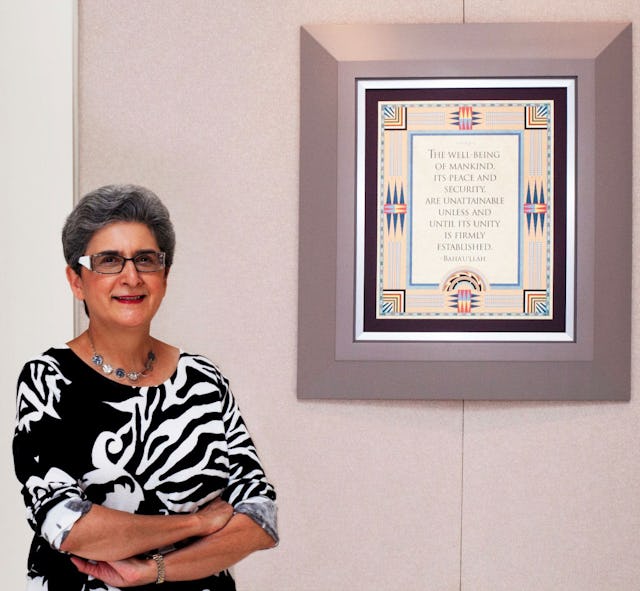Exploring the foundations of peace
COLLEGE PARK, MARYLAND, United States — It is 30 years since the Universal House of Justice released The Promise of World Peace, a groundbreaking statement addressed to the peoples of the world on the subject of global peace.
Presented to over 80 world leaders, The Promise of World Peace was published at a time when the question of a nuclear annihilation loomed large over humanity. Yet, it asserted that global peace is the inevitable next stage of humanity's social evolution. Whether the path to peace would entail enormous suffering, however, would depend on the decision of the world's leaders and its peoples. The letter provided a compelling exploration of the root causes of peace and extended the challenge of peace well beyond the questions of disarmament and security, to the deep-seated social disorders that act as barriers to peace.
Its release inspired the founding of The Baha'i Chair for World Peace at the University of Maryland in 1993.
"The head of the Center for International Development and Conflict Management at the university was very interested in the peace statement and said, 'Why not have a program on campus that explores this process-oriented approach to peace'," explains Dr. Hoda Mahmoudi, the current holder of the Baha'i Chair.
As an academic program at the University of Maryland, the Chair provides a forum to advance research on global peace issues. "Since its inauguration," describes Dr. Mahmoudi, "international academics and experts have been invited to participate in various forums and present insights on peace-related topics ranging from the advancement of women, structural racism, and the root causes of prejudice to understanding human nature and climate change.
"Within an academic setting the Baha'i Chair is trying to bring in new thinking about these issues, but, above all, thinking that also is willing to address values."
Our approach has also sought to integrate diverse disciplines in the pursuit of new insights in humanity's efforts to create a more peaceful world, Dr. Mahmoudi further explains.
"We invite many scholars to come and address barriers to peace," Dr. Mahmoudi says. "One of the requests we make is that they talk about solutions. Academics are good at diagnosis, and we are grateful for that. But the Chair is also seeking insights that can shed light on the seemingly intractable barriers to peace.
"This is a very difficult area, the solutions are not always clear.
"At no time does the Baha'i Chair believe that it has the answers. What it does believe that it's doing is engaging in a process of learning, research and education, to gain a more profound understanding of the barriers to peace and ways forward."
The Baha'i Chair not only brings in leading research on peace-related themes but also, in many ways, challenges some of the fundamental assumptions that have become consolidated in contemporary discourse and which block progress towards peace.
One such barrier, identified by the Universal House of Justice in The Promise of World Peace, is the belief that humanity is inherently and incorrigibly selfish. Addressing this subject in her inaugural address in 2012, Dr. Mahmoudi explained:
"Today, unfortunately, aggression and conflict characterize our social order, an order that encompasses political, religious, economic and cultural systems. In fact, many are resigned to the view that violence and warring are inborn human behaviors and, therefore, unchangeable. Such beliefs are often responsible for and lead to a paralysis of will among individuals, a cognitive numbness that is not easy to reverse, but which must be overcome. Here, the role of education is vital in removing unfounded views about human nature."
The Baha'i Chair's mission extends beyond dialogue between academics and experts and into the classroom. In her classes, as well as in talks open to the entire student body, Dr. Mahmoudi aims not only to expose students to the leading edge of thinking in academia but also to promote a culture of peace at the university and beyond.
The campus-wide community is also invited to conferences organized by the Chair. Earlier this year, up to 300 people attended a major conference, titled 'Global Transformations: Context and Analytics for a Durable Peace', which was co-hosted by the Chair together with the Baha'i International Community.
"We attract a lot of students around diverse disciplines," says Dr. Mahmoudi. "We're promoting a dialogue in which students interact with academics and practitioners, and often profound questions are asked.
"We can see that when we bring different minds together in a dialogue that is non-adversarial and that seeks to promote understanding, thought advances," says Dr. Mahmoudi.
Through its various forums, the Baha'i Chair captures emerging insights and publishes them as contributions to the discourses relevant to global peace.
Dr. Mahmoudi is the third holder of the Baha'i Chair, following Suheil Bushrui (1993-2006) and John Grayzel (2006-2011).
More information on the Baha'i Chair can be found here.
